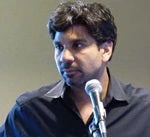 It’s 1998 and I am 23 years old. My thesis advisor, Abhijit Banerjee of MIT, along with some others, is trying to do, what would become his first, randomized evaluation in Rajasthan, India. The sacrificial goats appear to be me and Chris (the other research assistant on the project). Our threesome is completed by an old Yezdi motorcycle that has a tendency to go into reverse on starting it up.
It’s 1998 and I am 23 years old. My thesis advisor, Abhijit Banerjee of MIT, along with some others, is trying to do, what would become his first, randomized evaluation in Rajasthan, India. The sacrificial goats appear to be me and Chris (the other research assistant on the project). Our threesome is completed by an old Yezdi motorcycle that has a tendency to go into reverse on starting it up.
We are piloting a feeding program in Non-Formal Education schools run by a local NGO. We spend enormous amounts of time measuring out lentils and giving them to schools, and driving from one village to another on the motorcycle. Lost in lentils, we are not entirely sure what this research is getting at. But we carry on, regardless.The sample size for the feeding program appears to be two schools. We then discover the local game---hiding behind bushes on very winding roads and throwing livestock or chicken in front of cars and motorcycles to claim compensation. We spend a lot of time avoiding such randomly thrown animals.
Eventually, we lose. A hen comes on the road. I go left. Hen goes left. Go right, hen goes right. Swivel Yezdi around; hen flaps up, flaps down and dives under the motorcycle in what was clearly a trained and very successful suicide attempt. We are immediately surrounded by several very angry villagers. They demand 800 rupees for the hen—a king’s ransom. We say 100 rupees, because that’s the going rate at the market. They say no---because the hen would have had chicks and so on. Apparently we are not accounting properly for the presented discounted value of the stream of chickens in the future. We say we will buy a hen for them and bring it to them. They claim that this hen was special in a deeply unobservable way. We have nothing more to say. Like all good empirical economists, we can only hem and haw once omitted variables are brought into play. We pay 400 rupees. Within a week we are invited to a large feast with lots of food and drink. They managed to get a guy with a jeep to kill a goat.
 The randomized evaluation continues. We see many, many more kids attending the two schools where we are doing the feeding program. This is funny because the value of the food is two rupees per meal (we know this because we spend our life buying and measuring lentils) and the wage in the nearby stone mine (apparently the reason they were not going to school was because they were working in the mine) is 40 rupees and food. Our meal should not make the difference.
The randomized evaluation continues. We see many, many more kids attending the two schools where we are doing the feeding program. This is funny because the value of the food is two rupees per meal (we know this because we spend our life buying and measuring lentils) and the wage in the nearby stone mine (apparently the reason they were not going to school was because they were working in the mine) is 40 rupees and food. Our meal should not make the difference.
We think:
1. That for the kids who are coming, it is not really the parents but the kids who are making the decision to attend. These are kids who are not in the formal schooling system and the parents we talk to, tell us that they were sick of forcing the kids to go back to school day after day when the kids didn’t want to (they got beaten up quite a lot). So, by giving food to the kids, we made these settings a little more enjoyable for them. Two rupees is not a lot for parents. But for kids, a hot meal may mean quite a bit.
2. Learning could suffer. We discover that the teachers now spend a fair bit of their time cooking and the kids have to gather firewood everyday. These problems become better known, as the Government of India adopts midday meal schemes in state after state, and solutions start emerging. New research also starts focusing on the fact that most kids who are not in school are not working. They are dubbed as a new category of kids – “idle children”.
I learn that we can learn a lot from running randomized evaluations, although we never publish anything from this. I also become expert at measuring lentils and dodging livestock on rural Indian roads. Thanks, Chris.
Photo credit - the images were taken by Jishnu Das. The second image (" A meal in a school - 10 years later") shows that the mid-day meal is now a part of school life in India.


Join the Conversation